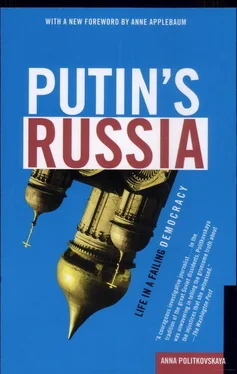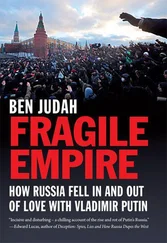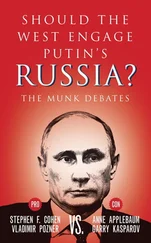A week passed, during which the Moscow office of the IRC considered my appeal. Then the charity rejected the request, mumbling something about the situation being “very complicated.” [5] The Red Cross is often unable to carry out its functions because the Russian authorities frequently withhold permission for prison visits.
THE PRECEDENT OF COLONEL BUDANOV
On July 25, 2003, in a North Caucasus district military court in Rostov-on-Don, sentence was finally passed on Yury Budanov, a combatant in the first and second Chechen wars and recipient of two Orders of Valor. He was sentenced to ten years in a strict-regime labor camp for crimes committed in Chechnya in the course of the second war. He had abducted a Chechen girl, Elza Kungaeva, and murdered her in an exceptionally brutal manner. The court further resolved to strip Budanov of his rank and state awards.
As noted earlier, the Budanov case began on March 26, 2000, the day Putin was elected president; it continued for more than three years. It became a test for all of us, from the Kremlin down to the smallest villages. We tried to make sense of the soldiers and officers who, every day, had murdered, robbed, tortured, and raped in Chechnya. Were they thugs and war criminals? Or were they unflinching champions in a global war against international terror, using all the weapons at their disposal, a noble aim justifying their despicable means? The Budanov case became highly politicized, turning into a symbol of our time. Among the Russian people, many crucial events that happened in those three years, in Russia and elsewhere, were seen in the light of this case: September 11, 2001, in the United States; the wars in Afghanistan and Iraq; the creation of an international antiterrorist coalition; terrorist acts in Russia; the seizing of hostages in Moscow in October 2002; the endless succession of Chechen women blowing themselves up; and the Palestinization of the second Chechen war.
This striking, tragic case brought our difficulties into the open. Most important, it revealed the changes that the Russian justice system has experienced under Putin and as a result of the war. The legal reform that the democrats had tried to implement and that Yeltsin had done all he could to promote collapsed under the pressure of the Budanov case; for over three years we were treated to a demonstration of the fact that we did not have an independent judiciary. Instead, the judicial system took its marching orders from the Kremlin. Moreover, we discovered that a majority of the population saw nothing out of the ordinary in this state of affairs. Today’s Russian, brainwashed by propaganda, has largely reverted to Bolshevik thinking.
On July 25, Kungaeva’s parents—who, more than most, understood what was going on—did not even bother to attend the court. They were certain the man who had butchered their daughter would be acquitted.
But then a miracle occurred, both a miracle and a courageous act by Judge Vladimir Bukreev. The judge dared to find Budanov guilty and, furthermore, to sentence him to a far-from-token period of detention. Bukreev thereby set himself against the military establishment, which had been actively working on Budanov’s behalf. The military courts come under the jurisdiction of the armed forces, whose commander in chief is the president. Yet, despite immense pressure from the Kremlin and the Ministry of Defense, Bukreev decided that Budanov should receive the sentence he merited. In the process, however, the judge showed beyond a doubt that the judicial system is fully in thrall to the politicians.
The Case
To dispel the myths surrounding the Budanov case, I will quote from the indictment. Despite the dry language of the prosecutor’s office, the following excerpts testify more eloquently to the climate of the second Chechen war than many journalists could. They convey the situation in units deployed in the “Zone of Antiterrorist Operations,” where anarchy rules. Lawlessness was the ultimate cause of the crimes committed by Yury Budanov, colonel of a tank regiment and commander of an elite army unit, a graduate of the military academy who had been awarded the country’s highest honors for his distinguished service.
Indictment in respect of Colonel Yury Dmitrievich Budanov, Army Unit 13206 (160th Tank Regiment), accused…
The preliminary investigation has established that:
Yury Dmitrievich Budanov was appointed on August 31, 1998, to the post of commander of Army Unit 13206 (160th Tank Regiment). On January 31, 2000, Budanov was awarded the military rank of colonel. Ivan Ivanovich Fedorov was awarded the rank of lieutenant colonel on August 12, 1997. On September 16, 1999, Fedorov was appointed to the post of chief of staff and deputy commander of Army Unit 13206 (160th Tank Regiment). On September 19, 1999, on the basis of Order of the General Headquarters of the Armed Forces of the Russian Federation No. 312/00264, Budanov and Fedorov left as part of Army Unit 13206 for duty in the North Caucasus Military District and were thereafter deployed to the Chechen Republic to engage in a counterterrorist operation. On March 26, 2000, Army Unit 13206 was temporarily deployed on the outskirts of the village of Tangi…. During dinner in the regimental officers’ mess, Budanov and Fedorov imbibed spiritous liquor to celebrate the birthday of Budanov’s daughter. At 19.00 hours that day, Budanov and Fedorov proceeded in a drunken state, together with a group of officers of the regiment and at Fedorov’s suggestion, to the intelligence company of the regiment under the command of Lieutenant R.V. Bagreev.
Having inspected the state of orderliness in the tents…, Fedorov desired to show Budanov that the intelligence company, to whose command Bagreev had been appointed on Fedorov’s recommendation, could be relied upon in a combat situation. He proposed that Budanov check their readiness for action. Budanov at first declined, but Fedorov insisted. After Fedorov had repeated his suggestion several times, Budanov gave permission to test the company’s combat readiness and proceeded with a group of officers to the Signals Center. Permission having been given, Fedorov decided, without telling Budanov, to order the use of regimental armaments to open fire on Tangi. Fedorov’s decision… was taken… without any actual necessity, since no fire was incoming…. Implementing his plan in flagrant violation of the requirement of Order of the General Headquarters of the Armed Forces of the Russian Federation of February 21, 2000, No. 312/2/0091, which forbids the use of intelligence subsections without thorough preparation…, Fedorov gave orders for firing positions to be taken up…. Obeying orders, Lieutenant Bagreev gave the command to the company’s personnel…. Three combat vehicles took up combat positions. After completing targeting, some members of the crews declined to carry out Fedorov’s order to open fire on a populated position. Continuing to exceed the authority of his rank, Fedorov insisted that they should open fire. Angered by the refusal of his subordinates, Fedorov began complaining to Bagreev. In a coarse manner he demanded that Bagreev should get his subordinates to open fire. Not satisfied with Bagreev’s actions, Fedorov began personally to direct the activity of the company’s personnel…. The crew opened fire… and a house… was destroyed. Having succeeded in getting the company’s personnel to carry out his unlawful order, Fedorov grabbed Bagreev by his clothing and continued to address him in a vulgar manner. Bagreev offered no resistance… and returned to the tent of his subsection.
Budanov… ordered Fedorov to stop firing and report to himself. Fedorov reported that Bagreev had deliberately failed to carry out his order to open fire. Bagreev was summoned to Budanov. Budanov… insulted him and then punched Bagreev at least twice in the face.
Читать дальше





![Stephan Orth - Behind Putin's Curtain - Friendships and Misadventures Inside Russia [aka Couchsurfing in Russia]](/books/415210/stephan-orth-behind-putin-s-curtain-friendships-a-thumb.webp)






